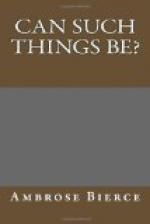Mr. Beeson’s buffet produced no effect, and after a moment’s pause, during which the wind thundered in the chimney like the sound of clods upon a coffin, he resumed:
“But, as you say, it is wearing me out. I feel that the life of the last two years has been a mistake—a mistake that corrects itself; you see how. The grave! No; there is no one to dig it. The ground is frozen, too. But you are very welcome. You may say at Bentley’s--but that is not important. It was very tough to cut: they braid silk into their pigtails. Kwaagh.”
Mr. Beeson was speaking with his eyes shut, and he wandered. His last word was a snore. A moment later he drew a long breath, opened his eyes with an effort, made a single remark, and fell into a deep sleep. What he said was this:
“They are swiping my dust!”
Then the aged stranger, who had not uttered one word since his arrival, arose from his seat and deliberately laid off his outer clothing, looking as angular in his flannels as the late Signorina Festorazzi, an Irish woman, six feet in height, and weighing fifty-six pounds, who used to exhibit herself in her chemise to the people of San Francisco. He then crept into one of the “bunks,” having first placed a revolver in easy reach, according to the custom of the country. This revolver he took from a shelf, and it was the one which Mr. Beeson had mentioned as that for which he had returned to the Gulch two years before.
In a few moments Mr. Beeson awoke, and seeing that his guest had retired he did likewise. But before doing so he approached the long, plaited wisp of pagan hair and gave it a powerful tug, to assure himself that it was fast and firm. The two beds—mere shelves covered with blankets not overclean—faced each other from opposite sides of the room, the little square trapdoor that had given access to the Chinaman’s grave being midway between. This, by the way, was crossed by a double row of spike-heads. In his resistance to the supernatural, Mr. Beeson had not disdained the use of material precautions.
The fire was now low, the flames burning bluely and petulantly, with occasional flashes, projecting spectral shadows on the walls—shadows that moved mysteriously about, now dividing, now uniting. The shadow of the pendent queue, however, kept moodily apart, near the roof at the further end of the room, looking like a note of admiration. The song of the pines outside had now risen to the dignity of a triumphal hymn. In the pauses the silence was dreadful.
It was during one of these intervals that the trap in the floor began to lift. Slowly and steadily it rose, and slowly and steadily rose the swaddled head of the old man in the bunk to observe it. Then, with a clap that shook the house to its foundation, it was thrown clean back, where it lay with its unsightly spikes pointing threateningly upward. Mr. Beeson awoke, and without rising, pressed his fingers into his eyes. He shuddered; his teeth chattered. His guest was now reclining on one elbow, watching the proceedings with the goggles that glowed like lamps.




